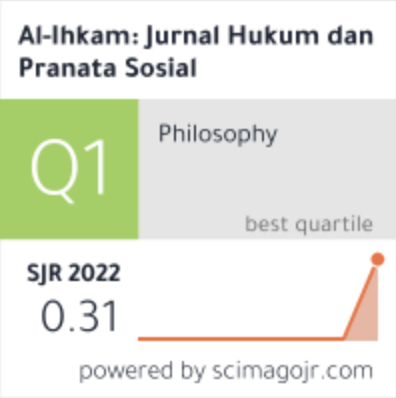The Common Goals of BAZNAS’ Zakat and Sustainable Development Goals (SDGs) according to Maqasid Al-Sharia Perspective
 Abstract views: 1250
,
Abstract views: 1250
,
 PDF downloads: 831
PDF downloads: 831
Abstract
This study aims to explain the common goals of zakat and Sustainable Development Goals (SDGs) from the perspective of maqasid al-Sharia. Zakat programs developed by the National Board of Amil Zakat (BAZNAS), especially in the economic, social and humanity, health, and education fields are in line with the SDGs programs launched by the United Nations, especially the programs number 1-4 namely no poverty, zero hunger, good health and well-being, and quality education. By using the maqasid al-Sharia approach, the SDGs programs that are included in the level of urgent needs (daruriyyah) and in accordance with the purpose of zakat, take precedence in its implementation such as the Mustahik Economic Empowerment Institute established by BAZNAS to improve the quality of life of mustahik. (Penelitian ini bertujuan untuk menjelaskan tujuan umum zakat dan SDGs dari perspektif maqasid al-Sharia. Program-program Zakat yang dikembangkan oleh Badan Amil Zakat Nasional (BAZNAS) khususnya dalam bidang ekonomi, sosial kemanusiaan, kesehatan, dan pendidikan sejalan dengan program-program tujuan pembangunan berkelanjutan (SDGs) yang dicanangkan oleh PBB, khusunya program no poverty, zero hunger, good health and weel-being, and quality education. Dengan menggunakan pendekatan maqasid al-Sharia, maka program-program SDGs yang masuk dalam tingkat kebutuhan yang mendesak (daruriyyah) dan sesuai dengan tujuan zakat, diutamakan dalam pengimplementasiannya seperti Lembaga Pemberdayaan Ekonomi Mustahik yang didirikan BAZNAS dengan tujuan untuk meningkatkan kualitas hidup mustahik.)
Downloads
References
Abdullah, M., and A.Q. Suhaib. “The Impact of Zakat on Social Life of Muslim Society.” Pakistan Journal of Islamic Research 8 (2011): 85–91.
Ahmad, et.al., Mohd Farhan. “The National Model of Philanthropy Towards the Global Philanthropic Practices.” In Proceeding Book 6th Southeast Asia International Islamic Philanthropy Conference, 167, 2018.
Auda, Jasser. Maqasid Al-Sharia: A Beginner’s Guide. London: The International Institute of Islamic Thought, 2008.
“Bappenas Luncurkan Buku Fikih Zakat on SDGs,” n.d. https://www.antaranews.com/berita/731600/.
BAZNAS, Divisi Riset dan Kajian. Sebuah Kajian Zakat on SDGs: Peran Zakat Dalam Sustainable Development Goals Untuk Pencapaian Maqashid Syariah. Jakarta: Tim Riset dan Pusat Kajian Strategi BAZNAS, 2017.
BAZNAS, Statistik Zakat Nasional 2015, Jakarta: Sub Divisi Pelaporan Basnaz, 2015. https://pid.BAZNAS.go.id/statistik/
BAZNAS, Statistik Zakat Nasional 2016, Jakarta: Sub Divisi Pelaporan Basnaz, 2016. https://pid.BAZNAS.go.id/statistik/
BAZNAS, Statistik Zakat Nasional 2017, Jakarta: Sub Divisi Pelaporan Basnaz, 2017. https://pid.BAZNAS.go.id/statistik/
BAZNAS, Statistik Zakat Nasional 2018, Jakarta: Sub Divisi Pelaporan Basnaz, 2018. https://pid.BAZNAS.go.id/statistik/
BAZNAS, Statistik Zakat Nasional 2019, Jakarta: Sub Divisi Pelaporan Basnaz, 2019. https://pid.BAZNAS.go.id/statistik/
“BAZNAS Kampanye Zakat Inclusion Di PBB,” n.d. https://www.tajuktimur.com/headline.
Chapra, M.U. Islam and the Economic Challenge. Riyadh: The Islamic Foundation and the International Institute of Islamic Thought, 1992.
Hariyanto, Erie, Muhammad Taufiq, Zainal Abidin, Miftahul Ulum, and Maimun. “Effectiveness of the Economic System to Zakat and Waqf for Empowerment of the Ummah in Indonesia.” International Journal of Advanced Science and Technology 29, no. 06 (2020): 1910–16. http://sersc.org/journals/index.php/IJAST/article/view/12895.
“Http://Www.Bps.Go.Id.,” n.d.
Kamali, Muhammad Hashem. Maqashid al-Syariah Made Simple. London: The International Institute of Islamic Thought, t.t.
Khalifah, Mohamad Handi, Mohammad Soleh Nurzaman, and Muhammad Cholil Nafis. “Optimization of BAZNAS Programs on Sustainable Development Goals (SDGs): Analytic Network Process Approach (ANP).” International Journal of Zakat 2, no. 1 (2017): 71–83.
Maksum dkk., Muhammad. Fikih Zakat on SDGs. Jakarta: PPSDM UIN JKT-BAZNAS, Mumtaza Press, 2018.
Q.S. al-Ma’arij (70): 24-25 (n.d.).
QS. al-Ma’arij (70): 24-25 (n.d.).
Rassanjani, Saddam. “Ending Poverty: Factors That Might Influence the Achievement of Sustainable Development Goals (SDGs) in Indonesia.” Journal of Public Administration and Governance 8, no. 3 (2018): 114–28.
Shaikh, Ahmad. “Role of Zakat in Sustainable Development Goals.” International Journal of Zakat 2, no. 1 (2017).
Suprayitno, Eko, Mohamed Aslam, and Azhar Harun. “Zakat and SDGs: Impact Zakat on Human Development in The Five States of Malaysia.” International Journal of Zakat 2, no. 1 (2017): 61–69.
Syukur, Syuhelmaidi. “Zakat on SDGs or Maqasid Syariah?,” March 16, 2017. https://kumparan.com/syuhelmaidi-syukur/zakat-on-sdgs/full.
Undang-Undang No. 23 Tahun 2011 about Pengelolaan Zakat (n.d.).
Undang-Undang tentang Pengelolaan Zakat No. 23 Tahun 2011 (2011).
Webster, Meriam. “Philanthropy.” In Oxford Dictionary, 2018.
In order to be accepted and published by Al-Ihkam: Jurnal Hukum dan Pranata Sosial, author(s) submitting the article manuscript should complete all the review stages. By submitting the manuscript, the author(s) agreed to the following terms:
- The copyright of received articles shall be assigned to Al-Ihkam: Jurnal Hukum dan Pranata Sosial as the publisher of the journal. The intended copyright includes the right to publish articles in various forms (including reprints). Al-Ihkam: Jurnal Hukum dan Pranata Sosial maintain the publishing rights to the published articles.
- Authors are permitted to disseminate published articles by sharing the link/DOI of the article at Al-Ihkam: Jurnal Hukum dan Pranata Sosial. Authors are allowed to use their articles for any legal purposes deemed necessary without written permission from Al-Ihkam: Jurnal Hukum dan Pranata Sosial with an acknowledgment of initial publication to this journal.
- Users/public use of this website will be licensed to CC-BY-SA.



.png)
_1.png)










